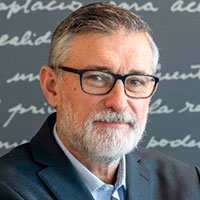Master’s Degree in Cybercrime

Eminently practical methodology
The Master’s Degree in Cybercrime trains students in the phenomenon of cybercrime, its agents, the environment where it takes place and its treatment, as well as favoring the training of management teams with the necessary skills for strategic management, prevention and treatment of this type of crimes.
This Master's Degree has the collaboration of the Spanish Police Foundation, the National Police Force and Telefónica Spain, consolidating the positioning of Nebrija University as an expert institution in the area of Security, a status that was already achieved with the implementation of the Undergraduate Degree in Security.
Starting from an eminently practical methodology, Nebrija University shows, with this exclusive program in Spain, the necessary instruments for a high-quality preparation in the different global intelligence services.
Student profile: Those interested in studying and obtaining the Master's Degree in Cybercrime from the Antonio de Nebrija University must be university graduates who carry out or wish to carry out their activity in the field of security, cybercrime or cybersecurity.
Profile of the graduate: Professional with a general view of the world of cybersecurity, with the necessary skills to obtain, maintain and process digital evidence, developing technical skills to carry out his/her skills and knowledge in this type of crime to the highest degree.
The graduate will have knowledge to implement and manage security policies in all types of companies, organizations and institutions.
Degrees that grant access to the Master:
Official Degree:Master´s Degree in Cybercrime
Center responsible:School of Law and International Relations
Openings available:
- 40 Classroom Attendance
- 50 Blended
- 60 Online
Branch of knowledge: Engineering and Architecture
Total Credits:60 credits.
.
Minimum of 12 ECTS credits and maximum of 60 ECTS credits per enrollment and academic period.
Academic year in which it was implemented: 2023
Type of Education: Class Attendance / Blended / Online
Academic Regulations: General student’s regulations. Credit transfer and recognition. Regulation of student participation. Common procedures for carrying out the Final Research Project
University Services: [+info]
With the best professionals in the sector
Curriculum
All our degrees and curricula have been prepared in accordance with the new guidelines set by current legislation, having already been verified by the National Agency for Quality Assessment.
The student must complete 60 credits
First Semester 30 ECTS
- 6 ECTS | Criminal and criminological aspects of cybercrime
- 6 ECTS | Cybersecurity principles
- 6 ECTS | National and international criminal procedural legal framework
- 6 ECTS | Criminological aspects of Cyber Intelligence
- 6 ECTS | Compliance and data protection fundamentals
Second Semester 30 ECTS
- 6 ECTS | Identification and evidence of the Cyberattack
- 6 ECTS | Criminal procedural law in digital areas
- 6 ECTS | Research methodology applied to cybercrime
- 6 ECTS | Professional internship
- 6 ECTS | Final Research Project
Training complements 12 ECTS
- 6 ECTS | Fundamental computer systems and networks
- 3 ECTS | Programming: Fundamentals of computer languages
- 3 ECTS | Databases
The training complements are not part of the Master's study plan and will be taken at the beginning of the first semester of the Master. Thus, students will be reinforced in the acquisition of said knowledge prior to the subjects taught in the second semester.
Professors
| Profesores Professors | Porcentaje de Doctores Percentage of PhD holders |
| 52 | 76,92% |
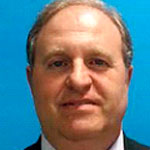 Bernardino Cortijo Fernández
Director del Máster
Director of the Master's Degree
Estudió Ciencias Matemáticas, licenciándose con las Especialidades de Investigación Operativa y Estadística (UNED), asimismo realizó el Grado en Derecho (Nebrija), Licenciatura en Ciencias Policiales (Salamanca-ESP) e Ingeniería de Caminos, Canales y Puertos (UPM- LAX). Tiene un postgrado en Telecomunicaciones (UPM), en Derecho Internacional e Internet (Santiago de Compostela) y en Delitos Tecnológicos (UEM). Diplomado en Inteligencia Artificial y Sistemas Expertos (INAP) y Analista Superior de Sistemas (INAP) y en Internet (LAX). Acreditado en Londres como LA/BS7799. Miembro acreditado de la Asociación Europea de Peritaje Forense.
Bernardino Cortijo Fernández
Director del Máster
Director of the Master's Degree
Estudió Ciencias Matemáticas, licenciándose con las Especialidades de Investigación Operativa y Estadística (UNED), asimismo realizó el Grado en Derecho (Nebrija), Licenciatura en Ciencias Policiales (Salamanca-ESP) e Ingeniería de Caminos, Canales y Puertos (UPM- LAX). Tiene un postgrado en Telecomunicaciones (UPM), en Derecho Internacional e Internet (Santiago de Compostela) y en Delitos Tecnológicos (UEM). Diplomado en Inteligencia Artificial y Sistemas Expertos (INAP) y Analista Superior de Sistemas (INAP) y en Internet (LAX). Acreditado en Londres como LA/BS7799. Miembro acreditado de la Asociación Europea de Peritaje Forense. Es miembro de la Escala Superior del Cuerpo Nacional de Policía (fundador de la Unidad de Delincuencia Tecnológica; responsable operativo en la Brigada de Delincuencia Económica y Financiera; Director de Proyectos Informáticos) y ha sido Vicepresidente y Directivo de empresas y filiales en Terra, Lycos, Endemol, Telefónica Corporación, Telefónica Europa y Telefónica España (responsabilidades de Seguridad, Gestión y Fraudes), y Presidente del Grupo de Comercio Electrónico para Europa y África. Actualmente es Vicepresidente de la Asociación de Directores de Seguridad y CEO y Consejero de empresas del sector de las Comunicaciones, Ciberseguridad y Ciberinteligencia.
Profesor del Master de Inteligencia de la URJC, Máster de Criminalidad de la UCA, profesor del Curso Superior de Gestión y Dirección de Seguridad en Universidades españolas (USAL) y Director del Máster de Ciberdelincuencia de la Universidad de Nebrija. Autor de libros y artículos relacionados con la Seguridad, el Derecho de la Nuevas Tecnologías, el Ciberterrorismo y la Dirección y Gestión de la Seguridad Privada.
 Luis A. García Segura
Coordinador Académico del Máster
Academic Coordinator of the Master's Degree
Certified Data Privacy Professional (CDPP); Doctor en Derecho; Máster en Derecho Empresarial y Abogado en ejercicio; miembro de la International Association of Privacy Professionals (IAPP); miembro de la Asociación Española para el Fomento de la Seguridad de la Información (ISMS Forum); miembro de la Asociación Española de Derecho del Entretenimiento (DENAE) y miembro asociado de la American Bar Association (ABA).
Miembro del Grupo de Investigación SEGERICO (Seguridad, Riesgos y Conflictos), así como Coordinador de la Cátedra Global Nebrija-Santander en gestión de riesgos y conflictos, de la Universidad Antonio de Nebrija. Ha sido autor de diversos artículos y libros, entre los que destacan:
Luis A. García Segura
Coordinador Académico del Máster
Academic Coordinator of the Master's Degree
Certified Data Privacy Professional (CDPP); Doctor en Derecho; Máster en Derecho Empresarial y Abogado en ejercicio; miembro de la International Association of Privacy Professionals (IAPP); miembro de la Asociación Española para el Fomento de la Seguridad de la Información (ISMS Forum); miembro de la Asociación Española de Derecho del Entretenimiento (DENAE) y miembro asociado de la American Bar Association (ABA).
Miembro del Grupo de Investigación SEGERICO (Seguridad, Riesgos y Conflictos), así como Coordinador de la Cátedra Global Nebrija-Santander en gestión de riesgos y conflictos, de la Universidad Antonio de Nebrija. Ha sido autor de diversos artículos y libros, entre los que destacan:• Cyberspace: risks and benefits for society (Ed.) (2017). Editorial Springer.
• Diseño, creación y administración de un despacho de Abogados (2016). Editorial Thomson Reuters.
• “Hacia un nuevo enfoque del conflicto ciber en el ámbito empresarial”. Diario La Ley. Año XXXVI, Número 8577. 7 de Julio de 2015.
• “The critical role of education in every Cyber defense strategy”. Northern Kentucky Law Review (2014) Vol. 41 nº 3. ps. 459-469
 Francisco García Herrero
Profesor
Professor
Doctor en Ingeniería Electrónica por la Universidad Politècnica de València. Evaluado positivamente por ANECA en la categoría de Profesor Titular. Su experiencia docente e investigadora se ha desarrollado en la Universidad Politècnica de València, la Universidad Europea Miguel de Cervantes, y la Universidad Antonio de Nebrija, tomando parte en numerosos proyectos nacionales de investigación. Sus líneas de investigación se centran en el diseño e implementación de algoritmos y arquitecturas para decodificadores para la corrección y detección de errores en sistemas de computación. Actualmente es Investigador Principal del Centro ARIES.
Francisco García Herrero
Profesor
Professor
Doctor en Ingeniería Electrónica por la Universidad Politècnica de València. Evaluado positivamente por ANECA en la categoría de Profesor Titular. Su experiencia docente e investigadora se ha desarrollado en la Universidad Politècnica de València, la Universidad Europea Miguel de Cervantes, y la Universidad Antonio de Nebrija, tomando parte en numerosos proyectos nacionales de investigación. Sus líneas de investigación se centran en el diseño e implementación de algoritmos y arquitecturas para decodificadores para la corrección y detección de errores en sistemas de computación. Actualmente es Investigador Principal del Centro ARIES.
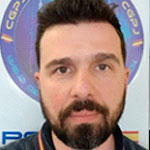 Juan María Cabo Pimentel
Profesor
Professor
Licenciado en Derecho por la Universidad Complutense de Madrid, Diploma en Ciencias Policiales por la Universidad de Salamanca. Inspector del CNP, experto en ciberataques. Actualmente se encuentra destinado en la Unidad Central de Ciberdelincuencia y mas concretamente en la Sección de Seguridad Logica de la Brigada General de Seguridad Informática
Juan María Cabo Pimentel
Profesor
Professor
Licenciado en Derecho por la Universidad Complutense de Madrid, Diploma en Ciencias Policiales por la Universidad de Salamanca. Inspector del CNP, experto en ciberataques. Actualmente se encuentra destinado en la Unidad Central de Ciberdelincuencia y mas concretamente en la Sección de Seguridad Logica de la Brigada General de Seguridad Informática
 José Luis Jerez Guerrero
Profesor
Professor
Ingeniero Superior en Informática por la Universidad Politécnica de Madrid, y dispone de varias certificaciones de seguridad internacionalmente reconocidas como CISSP (Certified Information System Security Professional por ISC2), CISM (Certified Information Security Manager por ISACA), CISA (Certified Information Systems Auditor por ISACA), CRISC (Certified in Risk and Information Systems Control por ISACA), ITIL Fundation v3 2011 por EXIN, así como certificaciones de varios de los fabricantes de soluciones de seguridad más relevantes.
José Luis Jerez Guerrero
Profesor
Professor
Ingeniero Superior en Informática por la Universidad Politécnica de Madrid, y dispone de varias certificaciones de seguridad internacionalmente reconocidas como CISSP (Certified Information System Security Professional por ISC2), CISM (Certified Information Security Manager por ISACA), CISA (Certified Information Systems Auditor por ISACA), CRISC (Certified in Risk and Information Systems Control por ISACA), ITIL Fundation v3 2011 por EXIN, así como certificaciones de varios de los fabricantes de soluciones de seguridad más relevantes.Profesional con 20 años de experiencia en ambientes técnicos y de seguridad, ha aplicado su experiencia en la gestión y la realización de soluciones innovadoras defensivas y ofensivas. Además de ofrecer servicios avanzados de seguridad técnica para diferentes organizaciones en diversas industrias en todo el mundo y clientes en ambientes multiculturales heterogéneos. Dispone de amplia experiencia en despliegue y gestión de SOCs (Security Operations Center), arquitectura de seguridad, respuesta a Incidentes CERT (Equipo de Respuesta a Emergencias por Ordenador), análisis forense, gestión de procesos de seguridad, proyectos de compliance de seguridad y pruebas de penetración (hacking ético), habiendo sido responsable de numerosos proyectos en multinacionales y en diferentes Países.
Realizó los seminarios de análisis forense y hacking ético para la Brigada de Investigación Tecnológica, desarrolló talleres en el ENISE relativos a hacking ético y e-administracion internacional. Es co-autor del documento “PROTECCIÓN DE INFRAESTRUCTURAS CRÍTICAS: Guía para la elaboración de Planes de Seguridad del Operador y Planes de Protección Específica”, ha participado en la revisión del libro “Big Intelligence. Nuevas capacidades Big Data para los sistemas de vigilancia estratégica e inteligencia competitiva”.
 María Riesco García
Profesora
Professor
Ingeniera de Telecomunicaciones por la Universidad Autónoma de Madrid. Especializada en investigación tecnológica en la Unidad de Investigación Tecnológica y actualmente, en la Comisaría General de Información. Máster en Ciencias Policiales por la Universidad de Salamanca y Programa de Innovación en Ciberseguridad por la Universidad de Deusto, entre otros cursos profesionales. Habilitación de Directora de Seguridad Privada, así como de Jefa de Seguridad Privada. Docente en cursos sobre investigación tecnológica, ciberdelincuencia, criptomonedas y darkweb, con carácter nacional e internacional, colaborando para ello con la ONU, INTERPOL e INCIBE, entre otros.
María Riesco García
Profesora
Professor
Ingeniera de Telecomunicaciones por la Universidad Autónoma de Madrid. Especializada en investigación tecnológica en la Unidad de Investigación Tecnológica y actualmente, en la Comisaría General de Información. Máster en Ciencias Policiales por la Universidad de Salamanca y Programa de Innovación en Ciberseguridad por la Universidad de Deusto, entre otros cursos profesionales. Habilitación de Directora de Seguridad Privada, así como de Jefa de Seguridad Privada. Docente en cursos sobre investigación tecnológica, ciberdelincuencia, criptomonedas y darkweb, con carácter nacional e internacional, colaborando para ello con la ONU, INTERPOL e INCIBE, entre otros.
 Andrés Jerónimo Arenas Falótico
Profesor
Professor
Abogado, Periodista, Máster en Administración de Empresas, Máster en Educación y Doctor en Management en los Estados Unidos. Ha sido premiado por su desempeño profesional y académico tanto nacional como internacionalmente, resalta “El Día de Andrés Arenas” que le otorgó la Alcaldía de Miami en Florida. Tiene más de 13 años en múltiples cargos académicos en universidades dentro y fuera de España. Cuenta con amplia experiencia gerencial de alto nivel en empresas multinacionales cómo CEMEX, BellSouth, Mack Trucks, entre otras. Sus líneas de investigación son relacionadas con el área de negocios internacionales y el área de emprendimiento empresarial satelital pues forma parte de un panel de expertos de Universidad de Tokio en Japón llamado “Mission Idea Contest”.
Andrés Jerónimo Arenas Falótico
Profesor
Professor
Abogado, Periodista, Máster en Administración de Empresas, Máster en Educación y Doctor en Management en los Estados Unidos. Ha sido premiado por su desempeño profesional y académico tanto nacional como internacionalmente, resalta “El Día de Andrés Arenas” que le otorgó la Alcaldía de Miami en Florida. Tiene más de 13 años en múltiples cargos académicos en universidades dentro y fuera de España. Cuenta con amplia experiencia gerencial de alto nivel en empresas multinacionales cómo CEMEX, BellSouth, Mack Trucks, entre otras. Sus líneas de investigación son relacionadas con el área de negocios internacionales y el área de emprendimiento empresarial satelital pues forma parte de un panel de expertos de Universidad de Tokio en Japón llamado “Mission Idea Contest”.
 José María Bautista Samaniego
Profesor
Professor
Licenciado y Doctor en Derecho por la Universidad Autónoma de Madrid .Técnico Urbanista (INAP).Máster en Derecho y Administración Local por la Universidad Autónoma de Madrid. Curso de Derecho Inmobiliario Privado en la Escuela de Práctica Jurídica Universidad Complutense de Madrid (año académico). Investigador en Derechos fundamentales y libertades púbicas en las Reales Ordenanzas para las Fuerzas Armadas. El militar ante la función pública: estudio de la Ley 17/1989, de 19 de julio, reguladora del régimen del personal militar profesional. Plazos para la solicitud del derecho de reversión. El derecho de reversión a la luz de la Ley 38/1999, de 5 de noviembre, de Ordenación de la Educación. Urbanismo y Defensa Nacional.Cuerpo Jurídico Militar, con destino actual en la Asesoría Jurídica General del Ministerio de Defensa. Con anterioridad: Subdirector General de Patrimonio e Inventario del Ayuntamiento de Madrid. Asesor Jurídico Jefe de la Gerencia de Infraestructura y Equipamiento del Ministerio de Defensa (Hoy INVIED).Secretaría General Técnica del Ministerio de Defensa (Unidad de Estudios Jurídicos).
José María Bautista Samaniego
Profesor
Professor
Licenciado y Doctor en Derecho por la Universidad Autónoma de Madrid .Técnico Urbanista (INAP).Máster en Derecho y Administración Local por la Universidad Autónoma de Madrid. Curso de Derecho Inmobiliario Privado en la Escuela de Práctica Jurídica Universidad Complutense de Madrid (año académico). Investigador en Derechos fundamentales y libertades púbicas en las Reales Ordenanzas para las Fuerzas Armadas. El militar ante la función pública: estudio de la Ley 17/1989, de 19 de julio, reguladora del régimen del personal militar profesional. Plazos para la solicitud del derecho de reversión. El derecho de reversión a la luz de la Ley 38/1999, de 5 de noviembre, de Ordenación de la Educación. Urbanismo y Defensa Nacional.Cuerpo Jurídico Militar, con destino actual en la Asesoría Jurídica General del Ministerio de Defensa. Con anterioridad: Subdirector General de Patrimonio e Inventario del Ayuntamiento de Madrid. Asesor Jurídico Jefe de la Gerencia de Infraestructura y Equipamiento del Ministerio de Defensa (Hoy INVIED).Secretaría General Técnica del Ministerio de Defensa (Unidad de Estudios Jurídicos).
 Jessica Bayón Pérez
Profesora
Professor
Doctora en Ciencias Sociales con especialidad en Recursos Humanos. Galardonada con la Medalla de Oro al Mérito del Trabajo por la Asociación Europea de Economía y Competitividad. Trayectoria profesional enfocada en Recursos Humanos en el ámbito Sociosanitario. Mejor expediente académico del Grado en Relaciones Laborales y Recursos Humanos con mención en asesoría de empresa. Ello, le faculta a postular el premio a nivel nacional de trayectoria académica por el Ministerio de Educación, Cultura y Deporte. Autora de contenidos en el área de empresa: Dirección estratégica de Empresa, Cultura Empresarial y Dirección y Gestión de aeropuertos. Trayectoria en diferentes Universidades en el ámbito Jurídico y Recursos Humanos. Ponente de Conferencias Internacionales, entrevistada en Onda Zero. Estancia postdoctoral en la Universidad de Hamk (Finlandia) y en la Universidad del Istmo (Panamá). Directora de Tesis: La Gestión Estratégica del Talento Humano como Potencial para la Ventaja Competitiva en las Organizaciones Marítimas y Aeroportuarias de Panamá. Universidad del Istmo. Publicaciones en la línea de investigación cómo la inteligencia artificial, robótica y las nuevas tecnologías están afectando a las relaciones laborales y a los derechos fundamentales.
Jessica Bayón Pérez
Profesora
Professor
Doctora en Ciencias Sociales con especialidad en Recursos Humanos. Galardonada con la Medalla de Oro al Mérito del Trabajo por la Asociación Europea de Economía y Competitividad. Trayectoria profesional enfocada en Recursos Humanos en el ámbito Sociosanitario. Mejor expediente académico del Grado en Relaciones Laborales y Recursos Humanos con mención en asesoría de empresa. Ello, le faculta a postular el premio a nivel nacional de trayectoria académica por el Ministerio de Educación, Cultura y Deporte. Autora de contenidos en el área de empresa: Dirección estratégica de Empresa, Cultura Empresarial y Dirección y Gestión de aeropuertos. Trayectoria en diferentes Universidades en el ámbito Jurídico y Recursos Humanos. Ponente de Conferencias Internacionales, entrevistada en Onda Zero. Estancia postdoctoral en la Universidad de Hamk (Finlandia) y en la Universidad del Istmo (Panamá). Directora de Tesis: La Gestión Estratégica del Talento Humano como Potencial para la Ventaja Competitiva en las Organizaciones Marítimas y Aeroportuarias de Panamá. Universidad del Istmo. Publicaciones en la línea de investigación cómo la inteligencia artificial, robótica y las nuevas tecnologías están afectando a las relaciones laborales y a los derechos fundamentales.
 Maria Elvira Atienza Moyna
Profesora
Professor
Doble Grado en Derecho y Ciencias Politicas y de la Administracion. Opositora a la Carrera judicial y fiscal. Master in Global Rule of Law and Constitutional Democracy en la Universidad de Genova.
Maria Elvira Atienza Moyna
Profesora
Professor
Doble Grado en Derecho y Ciencias Politicas y de la Administracion. Opositora a la Carrera judicial y fiscal. Master in Global Rule of Law and Constitutional Democracy en la Universidad de Genova.
 Susana Checa Prieto
Profesora
Professor
Doctora en derecho por la Universidad Nebrija. En la actualidad Directora de Estrategia del Centro Español de Derechos Reprográficos (CEDRO) Última publicación: Gestión colectiva en la administración de derechos exclusivos: especial referencia a la solución nórdica respecto a la digitalización masiva desarrollada por bibliotecas, hemerotecas, fonotecas o archivos y a la solución inglesa respecto a la gestión de los resúmenes de prensa (Diario La Ley, ISSN 1989-6913, Nº 8128, 2013) Representante habitual de CEDRO en congresos nacionales e internacionales, con más de 50 ponencias.
Susana Checa Prieto
Profesora
Professor
Doctora en derecho por la Universidad Nebrija. En la actualidad Directora de Estrategia del Centro Español de Derechos Reprográficos (CEDRO) Última publicación: Gestión colectiva en la administración de derechos exclusivos: especial referencia a la solución nórdica respecto a la digitalización masiva desarrollada por bibliotecas, hemerotecas, fonotecas o archivos y a la solución inglesa respecto a la gestión de los resúmenes de prensa (Diario La Ley, ISSN 1989-6913, Nº 8128, 2013) Representante habitual de CEDRO en congresos nacionales e internacionales, con más de 50 ponencias.
 María Contin Figueroa
Profesora
Professor
Doctora en Derecho, Licenciada por la Universidad de Zaragoza en 2001. En 2005 supero el concurso-oposición para ingresar en el Cuerpo Jurídico Militar, ejerciendo funciones de asesoramiento y fundamentalmente en Justicia, como fiscal. Ha realizado diversas publicaciones jurídicas y es profesora colaboradora de la Universidad Pontificia de Comillas en el área de Derecho Procesal desde 2011, y en la Universidad de Nebrija en Derecho Civil.
María Contin Figueroa
Profesora
Professor
Doctora en Derecho, Licenciada por la Universidad de Zaragoza en 2001. En 2005 supero el concurso-oposición para ingresar en el Cuerpo Jurídico Militar, ejerciendo funciones de asesoramiento y fundamentalmente en Justicia, como fiscal. Ha realizado diversas publicaciones jurídicas y es profesora colaboradora de la Universidad Pontificia de Comillas en el área de Derecho Procesal desde 2011, y en la Universidad de Nebrija en Derecho Civil.
 Victor Conde Salazar
Profesor
Professor
Dr. Economía y Administración de Empresas – Internacionalización de empresas (UNNE). Máster en Gestión Comercial y Marketing (ESIC). Licenciado en Ciencias Empresariales (UCM). Desde 1993 profesor en varias Universidades (Complutense, Nebrija, Salamanca, EAN de Colombia, TEC de Monterrey) y Escuelas de Negocio (ESIC, EAE, Nebrija, ESPM Brasil), tanto en España como en el extranjero. Ha sido coordinador del grado en ADE y y director de programas máster relacionados con emprendimiento, comercial y marketing. Actualmente, coordinador del Club de Emprendedores Nebrija. Desde 1977 ha desarrollado su actividad profesional en varias empresas multinacionales y españolas, con responsabilidades en el área de marketing, comercial, dirección general y consultoría. Actualmente es director general de la Asociación de Marketing de España. Dos de sus logros más significativos son el lanzamiento del diario El Mundo como director gerente de Unidad Editorial y el éxito de afluencia a la EXPO´92 de Sevilla, como director de marketing.
Victor Conde Salazar
Profesor
Professor
Dr. Economía y Administración de Empresas – Internacionalización de empresas (UNNE). Máster en Gestión Comercial y Marketing (ESIC). Licenciado en Ciencias Empresariales (UCM). Desde 1993 profesor en varias Universidades (Complutense, Nebrija, Salamanca, EAN de Colombia, TEC de Monterrey) y Escuelas de Negocio (ESIC, EAE, Nebrija, ESPM Brasil), tanto en España como en el extranjero. Ha sido coordinador del grado en ADE y y director de programas máster relacionados con emprendimiento, comercial y marketing. Actualmente, coordinador del Club de Emprendedores Nebrija. Desde 1977 ha desarrollado su actividad profesional en varias empresas multinacionales y españolas, con responsabilidades en el área de marketing, comercial, dirección general y consultoría. Actualmente es director general de la Asociación de Marketing de España. Dos de sus logros más significativos son el lanzamiento del diario El Mundo como director gerente de Unidad Editorial y el éxito de afluencia a la EXPO´92 de Sevilla, como director de marketing.
 Alfredo Dagnino Guerra
Profesor
Professor
Letrado del Consejo de Estado Abogado – Letrado asesor de empresas profesor de universidad y centros de postgrado.
Alfredo Dagnino Guerra
Profesor
Professor
Letrado del Consejo de Estado Abogado – Letrado asesor de empresas profesor de universidad y centros de postgrado. Abogado ejerciente del Ilustre Colegio de Abogados de Madrid (desde 1995).
En el desempeño de la condición de abogado y consultor ha venido prestando servicios profesionales de asesoramiento jurídico (consultivo y contencioso) y consultoría en firmas de reconocido prestigio nacional e internacional.
Letrado Asesor de organizaciones empresariales en diversos sectores económicos, Gestión de empresas e instituciones, Presidente Ejecutivo de la Fundación Universitaria San Pablo CEU y Gran Canciller de las Universidades CEU (2006-2011), Presidente Ejecutivo de la Fundación Intereconomía (2011-2013), Consejero Ejecutivo del Grupo Intereconomía (2011-2012).
 Fernando Davara Rodríguez
Profesor
Professor
General de Brigada de Artillería (R), Diplomado de Estado Mayor y Doctor “cum laude” en Ingeniería Informática.
Fernando Davara Rodríguez
Profesor
Professor
General de Brigada de Artillería (R), Diplomado de Estado Mayor y Doctor “cum laude” en Ingeniería Informática.Ha dedicado más de 30 años de trabajo e investigación en los dominios del Espacio y sus aplicaciones, Gestión de crisis, Seguridad lógica y Ciberseguridad, Tecnologías de la Información y las Comunicaciones, Geomática, Inteligencia Económica y Competitiva, etc.
En estos ámbitos ha sido autor de numerosos trabajos y monografías, participado en gran número de seminarios y coloquios (nacionales e internacionales), llevado a cabo varias actividades investigadoras y ocupado diversos cargos nacionales y extranjeros, entre ellos seis años como Director del Centro de Satélites de la Unión Europea (EUSC).
Actualmente es:
- Director y Patrono de la Fundación “ESPAÑA DIGITAL” y Director de sus Foros de Ciberseguridad y Formación,
- Director académico del Máster en Dirección y Gestión de la Ciberseguridad de la Fundación AUCAL y la Universidad A. de Nebrija,
- Presidente de APIC (Asociación para la Protección de las Infraestructuras Críticas),
- Asimismo es profesor y asesor de diversos Máster y Cursos de Postgrado, entre ellos el Postgrado de Inteligencia Económica y Seguridad (PIES) de ICADE y MAS Consulting, así como de Inteligencia Empresarial y Ciberseguridad en Cursos y Maestrías en diversas instituciones en España e Iberoamérica (Portugal, Méjico, Ecuador, Colombia....)
 Giuseppe Kodjack Gangi Guillén
Profesor
Professor
Licenciado en Ciencias y Artes militares de la Academia Militar de Venezuela (Mención Honorífica 1996-2001 en la especialidad de Armamento), Master en DIH, Logística Militar y Gestión de RRHH. Profesor de Derecho Internacional Humanitario de la Academia Militar de Venezuela. Profesor de Doctrina Logística Militar en la Escuela de Logística del Ejército de Venezuela. Profesor de Logística de Combate en el Instituto Universitario Politécnico de la Fuerza Armada Nacional de Venezuela. Desarrollo de la Cátedra “Prisionero de Guerra” en el Instituto Universitario Politécnico de la Fuerza Armada Nacional de Venezuela. Instructor de Defensa Personal y Tiro de Combate el Áreas Urbanas. Ha participado en el trabajo de investigación sobre Análisis del Conflicto Armado Colombo-Venezolano; perspectivas históricas y sus desviaciones políticas, y actualmente está desarrollando la investigación sobre las Élites Musulmanas en Latinoamérica y su influencia en el ámbito económico, político y social.
Giuseppe Kodjack Gangi Guillén
Profesor
Professor
Licenciado en Ciencias y Artes militares de la Academia Militar de Venezuela (Mención Honorífica 1996-2001 en la especialidad de Armamento), Master en DIH, Logística Militar y Gestión de RRHH. Profesor de Derecho Internacional Humanitario de la Academia Militar de Venezuela. Profesor de Doctrina Logística Militar en la Escuela de Logística del Ejército de Venezuela. Profesor de Logística de Combate en el Instituto Universitario Politécnico de la Fuerza Armada Nacional de Venezuela. Desarrollo de la Cátedra “Prisionero de Guerra” en el Instituto Universitario Politécnico de la Fuerza Armada Nacional de Venezuela. Instructor de Defensa Personal y Tiro de Combate el Áreas Urbanas. Ha participado en el trabajo de investigación sobre Análisis del Conflicto Armado Colombo-Venezolano; perspectivas históricas y sus desviaciones políticas, y actualmente está desarrollando la investigación sobre las Élites Musulmanas en Latinoamérica y su influencia en el ámbito económico, político y social.
 Mónica Pucci Rey
Profesora
Professor
Doctora en Derecho Procesal por la UCM (2000), Licenciada en Derecho por la UCM (1996) y Graduada en Ciencias Jurídicas de las Administraciones Públicas por la UNED (2021). Procuradora de los Tribunales del Ilustre Colegio de Procuradores de Madrid (ICPM) ejerciente desde 2005. Profesora Titular en el Departamento de Derecho de la Facultad de Derecho y de Relaciones Internacionales de la Universidad Antonio de Nebrija, Directora del Grado en Seguridad y Coordinadora de la Clínica Jurídica en esta Universidad. Anteriormente ha impartido docencia en Grado y Postgrado en otras Universidades fundamentalmente en Derecho Procesal y otras asignaturas (Universidad Rey Juan Carlos, Universidad Alfonso X el Sabio, Eserp Business School Madrid y UNED). Vocal de la Comisión de Turno de Oficio y Justicia Gratuita del ICPM. Colegiada adscrita a la Union Internationale des Huissiers de Justice (UIHJ). Profesora-preparadora de opositores a la Administración de Justicia. Perito Contador-partidor. Experta en actos de comunicación procesales. Investigadora y ponente en varias jornadas, congresos y seminarios sobre Derecho Procesal. Autora de varios artículos y capítulos de libros.
Mónica Pucci Rey
Profesora
Professor
Doctora en Derecho Procesal por la UCM (2000), Licenciada en Derecho por la UCM (1996) y Graduada en Ciencias Jurídicas de las Administraciones Públicas por la UNED (2021). Procuradora de los Tribunales del Ilustre Colegio de Procuradores de Madrid (ICPM) ejerciente desde 2005. Profesora Titular en el Departamento de Derecho de la Facultad de Derecho y de Relaciones Internacionales de la Universidad Antonio de Nebrija, Directora del Grado en Seguridad y Coordinadora de la Clínica Jurídica en esta Universidad. Anteriormente ha impartido docencia en Grado y Postgrado en otras Universidades fundamentalmente en Derecho Procesal y otras asignaturas (Universidad Rey Juan Carlos, Universidad Alfonso X el Sabio, Eserp Business School Madrid y UNED). Vocal de la Comisión de Turno de Oficio y Justicia Gratuita del ICPM. Colegiada adscrita a la Union Internationale des Huissiers de Justice (UIHJ). Profesora-preparadora de opositores a la Administración de Justicia. Perito Contador-partidor. Experta en actos de comunicación procesales. Investigadora y ponente en varias jornadas, congresos y seminarios sobre Derecho Procesal. Autora de varios artículos y capítulos de libros.
 David Docal Gil
Profesor
Professor
Doctor por la Universidad Rey Juan Carlos en 2010.
Licenciado en Ciencias del Trabajo en 2004, Diploma en Estudios Avanzados, 2006.
Subinspector del Cuerpo Nacional de Policía, destinado en el Centro de Altos Estudios Policiales y licenciado en Ciencias del Trabajo.
David Docal Gil
Profesor
Professor
Doctor por la Universidad Rey Juan Carlos en 2010.
Licenciado en Ciencias del Trabajo en 2004, Diploma en Estudios Avanzados, 2006.
Subinspector del Cuerpo Nacional de Policía, destinado en el Centro de Altos Estudios Policiales y licenciado en Ciencias del Trabajo.
 Carlos Espaliu Berdud
Profesor
Professor
Carlos Espaliú, nuevo investigador principal del Grupo Nebrija de Seguridad, Gestión de Riesgos y Conflictos de la Facultad de Derecho y de Relaciones Internacionales. Licenciado en Derecho y doctor en Derecho Internacional Público por la Universidad de Córdoba, Espaliú está acreditado como catedrático de universidad. A lo largo de su trayectoria profesional, ha impartido docencia en varias universidades y ha sido vicedecano en la Universidad Internacional de Cataluña. Destaca por su labor de investigación, con 52 publicaciones científicas y su participación en 8 proyectos de investigación competitivos, acumulando el reconocimiento de varios sexenios de investigación.
Carlos Espaliu Berdud
Profesor
Professor
Carlos Espaliú, nuevo investigador principal del Grupo Nebrija de Seguridad, Gestión de Riesgos y Conflictos de la Facultad de Derecho y de Relaciones Internacionales. Licenciado en Derecho y doctor en Derecho Internacional Público por la Universidad de Córdoba, Espaliú está acreditado como catedrático de universidad. A lo largo de su trayectoria profesional, ha impartido docencia en varias universidades y ha sido vicedecano en la Universidad Internacional de Cataluña. Destaca por su labor de investigación, con 52 publicaciones científicas y su participación en 8 proyectos de investigación competitivos, acumulando el reconocimiento de varios sexenios de investigación.
 Borja González del Regueral
Profesor
Professor
González del Regueral ha desarrollado su carrera profesional en actividades de transformación de negocio y digital en el sector energético y de educación. Cabe destacar su paso por IE University desde 2017 donde ha ejercido como Vicedecano de Data Science and Technology creando e impulsando el portfolio de programas de Máster y Grado en esta área. Anteriormente, ha desarrollado su carrera profesional en BP (British Petroleum) liderando la transformación de negocio de la misma, optimizando y creando centros de servicios compartidos, introduciendo servicios de analítica y mejorando procesos comerciales a nivel mundial. Anteriormente, durante su etapa en Iberdrola, participó en el lanzamiento de nuevos negocios, así como la transformación, internacionalización e integración de negocio en siete países. El profesor González del Regueral es ingeniero de Minas por la Universidad Politécnica de Madrid, ha estudiado varios másteres en la Universidad Pontificia de Comillas e IE Business School y ha publicado artículos en diversas revistas internacionales, así como patentado procesos dando lugar a la creación de su propia empresa.
Borja González del Regueral
Profesor
Professor
González del Regueral ha desarrollado su carrera profesional en actividades de transformación de negocio y digital en el sector energético y de educación. Cabe destacar su paso por IE University desde 2017 donde ha ejercido como Vicedecano de Data Science and Technology creando e impulsando el portfolio de programas de Máster y Grado en esta área. Anteriormente, ha desarrollado su carrera profesional en BP (British Petroleum) liderando la transformación de negocio de la misma, optimizando y creando centros de servicios compartidos, introduciendo servicios de analítica y mejorando procesos comerciales a nivel mundial. Anteriormente, durante su etapa en Iberdrola, participó en el lanzamiento de nuevos negocios, así como la transformación, internacionalización e integración de negocio en siete países. El profesor González del Regueral es ingeniero de Minas por la Universidad Politécnica de Madrid, ha estudiado varios másteres en la Universidad Pontificia de Comillas e IE Business School y ha publicado artículos en diversas revistas internacionales, así como patentado procesos dando lugar a la creación de su propia empresa.
 Luis Ángel Galindo
Profesor
Professor
Doctor Ingeniero de Telecomunicaciones por la UPM. EMBA por IESE. Master en Servicios y Seguridad en Internet por UPM. Master en Gestión de la Producción por CEPADE-UPM.
Empieza su carrera profesional en Motorola donde dirige el despliegue de la red Moviline. Desde 1996 está trabajando en Telefónica donde ha ocupado diversas responsabilidades: Jefe del área de Fraude, Jefe del Despliegue del Territorio Este, Gerente de Tecnología, Director de Tuenti y Director de Innovación, puesto que desempeña actualmente.
Es profesor en UC3M, IESE, ESCP y en el Máster en Ciberdelincuencia en la Universidad Nebrija y participa en un grupo de investigación de la URJC acerca del impacto de Internet en los medios.
Luis Ángel Galindo
Profesor
Professor
Doctor Ingeniero de Telecomunicaciones por la UPM. EMBA por IESE. Master en Servicios y Seguridad en Internet por UPM. Master en Gestión de la Producción por CEPADE-UPM.
Empieza su carrera profesional en Motorola donde dirige el despliegue de la red Moviline. Desde 1996 está trabajando en Telefónica donde ha ocupado diversas responsabilidades: Jefe del área de Fraude, Jefe del Despliegue del Territorio Este, Gerente de Tecnología, Director de Tuenti y Director de Innovación, puesto que desempeña actualmente.
Es profesor en UC3M, IESE, ESCP y en el Máster en Ciberdelincuencia en la Universidad Nebrija y participa en un grupo de investigación de la URJC acerca del impacto de Internet en los medios.
 Luis Armando García Segura
Profesor
Professor
Doctor en Derecho por la Universidad Antonio de Nebrija. Licenciado en Derecho por la Pontificia Universidad Católica Madre y Maestra de Santo Domingo en el año 2007, Cum Laude y Máster en Derecho Empresarial por la Universidad de Nebrija. Ha trabajado tanto para el sector público como privado en temas de educación y Derecho. Forma parte del equipo de Asesoría Jurídica de la Universidad Nebrija, además de ser coordinador académico del Máster en Comunicación Estratégica para gobiernos e instituciones públicas. Es abogado ejerciente del Ilustre Colegio de Abogados de Madrid (ICAM) y miembro académico de la American Bar Association (ABA) de Estados Unidos de América.
Luis Armando García Segura
Profesor
Professor
Doctor en Derecho por la Universidad Antonio de Nebrija. Licenciado en Derecho por la Pontificia Universidad Católica Madre y Maestra de Santo Domingo en el año 2007, Cum Laude y Máster en Derecho Empresarial por la Universidad de Nebrija. Ha trabajado tanto para el sector público como privado en temas de educación y Derecho. Forma parte del equipo de Asesoría Jurídica de la Universidad Nebrija, además de ser coordinador académico del Máster en Comunicación Estratégica para gobiernos e instituciones públicas. Es abogado ejerciente del Ilustre Colegio de Abogados de Madrid (ICAM) y miembro académico de la American Bar Association (ABA) de Estados Unidos de América.
 César Giner Alegría
Profesor
Professor
Doctor en el Programa de Abogacía y Práctica Jurídica y Licenciado en Criminología y Psicología.
César Giner Alegría
Profesor
Professor
Doctor en el Programa de Abogacía y Práctica Jurídica y Licenciado en Criminología y Psicología.
 Juana Gómez González
Profesora
Professor
Doctora por la Universidad Camilo José Cela : “Comunicación y Derecho:
problemática de la justicia penal en Internet” (2010). Colegiada ICAM.
2005/2013. Profesora Derecho romano, Derecho civil - Departamento de
Derecho (UCJC). 2012/2014 Miembro de la Comisión Multidisciplinar para
el estudio del sumario por el magnicidio de Juan Prim y Prats, del
Departamento de Criminología (UCJC). 2011/2013 Investigadora
responsable del Grupo de Investigación “Derecho e Informática” de la
Facultad de Ciencias Jurídicas y Económicas de la UCJC. Elaboración de la
obra colaborativa Manual de Derecho Informático, ocupándome de los
capítulos Delito Informático, Contratación Electrónica, y Comercio
Electrónico. 2007/2009. Proyecto de investigación: Tecnologías de la
Información y de la Comunicación: Internet, Videojuego y Telefonía Móvil.
Financiado por la Fundación Española de la Ciencia y la Tecnología.
Juana Gómez González
Profesora
Professor
Doctora por la Universidad Camilo José Cela : “Comunicación y Derecho:
problemática de la justicia penal en Internet” (2010). Colegiada ICAM.
2005/2013. Profesora Derecho romano, Derecho civil - Departamento de
Derecho (UCJC). 2012/2014 Miembro de la Comisión Multidisciplinar para
el estudio del sumario por el magnicidio de Juan Prim y Prats, del
Departamento de Criminología (UCJC). 2011/2013 Investigadora
responsable del Grupo de Investigación “Derecho e Informática” de la
Facultad de Ciencias Jurídicas y Económicas de la UCJC. Elaboración de la
obra colaborativa Manual de Derecho Informático, ocupándome de los
capítulos Delito Informático, Contratación Electrónica, y Comercio
Electrónico. 2007/2009. Proyecto de investigación: Tecnologías de la
Información y de la Comunicación: Internet, Videojuego y Telefonía Móvil.
Financiado por la Fundación Española de la Ciencia y la Tecnología.
 Begoña del Carmen Lluva Rivera
Profesora
Professor
Profesora del área de Derecho y Seguridad. Procuradora de los Tribunales y con despacho propio desde el año 1993. Mediadora Familiar, Civil, Mercantil y Tráfico. Doctora en Derecho por la UNED en el año 2000.
Begoña del Carmen Lluva Rivera
Profesora
Professor
Profesora del área de Derecho y Seguridad. Procuradora de los Tribunales y con despacho propio desde el año 1993. Mediadora Familiar, Civil, Mercantil y Tráfico. Doctora en Derecho por la UNED en el año 2000.
 Daniel Magaña Martínez
Profesor
Professor
Ingeniero en Informática por la Universidad Antonio de Nebrija. Máster en Dirección de Empresas Tecnológicas por la Universidad Oberta de Catalunya, Máster en Dirección y Organización de Proyectos por la Universidad Antonio de Nebrija y Doctor en Ciencias Sociales (Dirección de Proyectos), por la misma Universidad, con la tesis: “Sistema de alerta temprana para la gestión de riesgos: un modelo basado en el análisis de las comunicaciones escritas dentro del ámbito del proyecto”.
Profesionalmente, ha ejercido la docencia en la Universidad Nebrija dentro del Máster en Dirección y Organización de Proyectos.
Cuenta con una dilatada experiencia profesional en el campo de la gestión de Sistemas Informáticos, donde ha ejercido como Director del Departamento de Sistemas durante 16 años.
Sus últimas publicaciones científicas han sido en revistas económicas de impacto, sobre temas relacionados con los Sistemas de alerta temprana en la Dirección de proyectos.
En relación a la asignatura que imparte y a las competencias profesionales del área, ha publicado:
Magaña, Daniel, Fernández, Juan C (2016): LOS SISTEMAS DE ALERTA TEMPRANA APLICADOS A LA DIRECCIÓN DE PROYECTOS: UNA REVIÓN DE LA LITERATURA.
Magaña, Daniel, Fernández, Juan C (2015): Artificial Intelligence Applied to Project Success: A Literature Review.
Daniel Magaña Martínez
Profesor
Professor
Ingeniero en Informática por la Universidad Antonio de Nebrija. Máster en Dirección de Empresas Tecnológicas por la Universidad Oberta de Catalunya, Máster en Dirección y Organización de Proyectos por la Universidad Antonio de Nebrija y Doctor en Ciencias Sociales (Dirección de Proyectos), por la misma Universidad, con la tesis: “Sistema de alerta temprana para la gestión de riesgos: un modelo basado en el análisis de las comunicaciones escritas dentro del ámbito del proyecto”.
Profesionalmente, ha ejercido la docencia en la Universidad Nebrija dentro del Máster en Dirección y Organización de Proyectos.
Cuenta con una dilatada experiencia profesional en el campo de la gestión de Sistemas Informáticos, donde ha ejercido como Director del Departamento de Sistemas durante 16 años.
Sus últimas publicaciones científicas han sido en revistas económicas de impacto, sobre temas relacionados con los Sistemas de alerta temprana en la Dirección de proyectos.
En relación a la asignatura que imparte y a las competencias profesionales del área, ha publicado:
Magaña, Daniel, Fernández, Juan C (2016): LOS SISTEMAS DE ALERTA TEMPRANA APLICADOS A LA DIRECCIÓN DE PROYECTOS: UNA REVIÓN DE LA LITERATURA.
Magaña, Daniel, Fernández, Juan C (2015): Artificial Intelligence Applied to Project Success: A Literature Review.
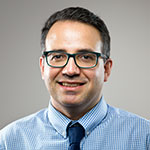 Jorge Hernando Cuñado
Profesor
Professor
Profesor de Economía y Empresa. Doctor en Fundamentos de Economía. Universidad Complutense. Programa Superior en Dirección de Ventas. ESIC Certificate of Proficiency in English. Cambridge University. Máster Universitario en Formación del Profesorado de Secundaria UNED. Experiencia laboral como Consultor de Fondos Europeos en el Ministerio de Economía. Experiencia Internacional: Accenture Ireland, Citigroup Ireland. Experiencia docente en las Universidades de París-Sorbona, Coímbra, Portsmouth y Münster Applied Sciences dentro del programa Erasmus Plus. Autor de diversos artículos científicos y de prensa.
Jorge Hernando Cuñado
Profesor
Professor
Profesor de Economía y Empresa. Doctor en Fundamentos de Economía. Universidad Complutense. Programa Superior en Dirección de Ventas. ESIC Certificate of Proficiency in English. Cambridge University. Máster Universitario en Formación del Profesorado de Secundaria UNED. Experiencia laboral como Consultor de Fondos Europeos en el Ministerio de Economía. Experiencia Internacional: Accenture Ireland, Citigroup Ireland. Experiencia docente en las Universidades de París-Sorbona, Coímbra, Portsmouth y Münster Applied Sciences dentro del programa Erasmus Plus. Autor de diversos artículos científicos y de prensa.
 Natalia Iturregui García de Motiloa
Profesora
Professor
Graduada en Derecho y Economía por la Universidad de Deusto (Bilbao). Máster de Acceso al Ejercicio de la Abogacía con la especialidad de Derecho Laboral impartido por la Universidad Carlos III de Madrid. Actualmente Asociada en el Departamento de Regulatory & Compliance, concretamente en el área de Corporate Defense, de Deloitte Abogados.
Natalia Iturregui García de Motiloa
Profesora
Professor
Graduada en Derecho y Economía por la Universidad de Deusto (Bilbao). Máster de Acceso al Ejercicio de la Abogacía con la especialidad de Derecho Laboral impartido por la Universidad Carlos III de Madrid. Actualmente Asociada en el Departamento de Regulatory & Compliance, concretamente en el área de Corporate Defense, de Deloitte Abogados.
 María Caterina La Barbera
Profesora
Professor
Doctora en Derechos Humanos por la Universidad de Palermo, Italia. Ha tenido experiencia docente e investigadora en instituciones españolas y extranjeras, entre las cuales la Universidad de Palermo, la Universidad de California-Berkeley, el Centro de Ciencias Humanas y Sociales del CSIC, el Centro de Estudios Políticos y Constitucionales, la UNED y la Universidad Carlos III de Madrid. Está acreditada como Profesora Contratada Doctora y Profesora de Universidad Privada por la ANECA. Ha sido investigadora principal de proyectos de investigación competitivos. Su línea de investigación se encuentra entre los estudios críticos del derecho y las políticas públicas, abarcando los derechos humanos de personas y colectivos vulnerables, especialmente las mujeres y las minorías culturales. Investiga los conflictos materiales y discursivos que se articulan en la intersección entre distintos ejes de desigualdad estructural. Es autora de la monografía “Multicentered Feminism” (Compostampa 2009) y ha editado los volúmenes “Identity and Migration in Europe” (Springer 2015) e “Igualdad de género y no discriminación en España” (CEPC 2016). Cuenta además con numerosas publicaciones en revistas indexadas y capítulos de libros en inglés, español e italiano.
María Caterina La Barbera
Profesora
Professor
Doctora en Derechos Humanos por la Universidad de Palermo, Italia. Ha tenido experiencia docente e investigadora en instituciones españolas y extranjeras, entre las cuales la Universidad de Palermo, la Universidad de California-Berkeley, el Centro de Ciencias Humanas y Sociales del CSIC, el Centro de Estudios Políticos y Constitucionales, la UNED y la Universidad Carlos III de Madrid. Está acreditada como Profesora Contratada Doctora y Profesora de Universidad Privada por la ANECA. Ha sido investigadora principal de proyectos de investigación competitivos. Su línea de investigación se encuentra entre los estudios críticos del derecho y las políticas públicas, abarcando los derechos humanos de personas y colectivos vulnerables, especialmente las mujeres y las minorías culturales. Investiga los conflictos materiales y discursivos que se articulan en la intersección entre distintos ejes de desigualdad estructural. Es autora de la monografía “Multicentered Feminism” (Compostampa 2009) y ha editado los volúmenes “Identity and Migration in Europe” (Springer 2015) e “Igualdad de género y no discriminación en España” (CEPC 2016). Cuenta además con numerosas publicaciones en revistas indexadas y capítulos de libros en inglés, español e italiano.
 Andrea Carrera
Profesor
Professor
Doctor en Economía (calificación: Sobresaliente Cum Laude y mención Doctor Internacional) por la Universidad de Zaragoza desde Septiembre de 2018 y acreditado por la ANECA como Profesor Ayudante Doctor en Ciencias Sociales y Jurídicas desde Febrero de 2019. En la actualidad, es Investigador - Profesor en el Departamento de Administración de Empresas de la Universidad Nebrija en Madrid. Anteriormente, fue parte de la Universidad de Zaragoza (sede Zaragoza) como Profesor Asociado (Noviembre 2018 – Agosto 2019) y como Investigador Predoctoral en Formación (Septiembre de 2015 a Septiembre de 2018), desempeñando sus labores en el Departamento de Análisis Económico de la Facultad de Economía y Empresa de dicha Universidad. Su principal área de investigación es la Microeconomía y, en particular la Economía familiar y de la Población, con intereses específicos en las diferencias de género en los Usos del Tiempo. Sus trabajos de Investigación han sido publicados en revistas de alto impacto (JCR): Feminist Economics, Journal of Development Studies y Applied Economics Letters.
Andrea Carrera
Profesor
Professor
Doctor en Economía (calificación: Sobresaliente Cum Laude y mención Doctor Internacional) por la Universidad de Zaragoza desde Septiembre de 2018 y acreditado por la ANECA como Profesor Ayudante Doctor en Ciencias Sociales y Jurídicas desde Febrero de 2019. En la actualidad, es Investigador - Profesor en el Departamento de Administración de Empresas de la Universidad Nebrija en Madrid. Anteriormente, fue parte de la Universidad de Zaragoza (sede Zaragoza) como Profesor Asociado (Noviembre 2018 – Agosto 2019) y como Investigador Predoctoral en Formación (Septiembre de 2015 a Septiembre de 2018), desempeñando sus labores en el Departamento de Análisis Económico de la Facultad de Economía y Empresa de dicha Universidad. Su principal área de investigación es la Microeconomía y, en particular la Economía familiar y de la Población, con intereses específicos en las diferencias de género en los Usos del Tiempo. Sus trabajos de Investigación han sido publicados en revistas de alto impacto (JCR): Feminist Economics, Journal of Development Studies y Applied Economics Letters.
 Carlos Lli Torrebadella
Profesor
Professor
PhD en Dirección de Empresas Internacionales por la Universidad Nebrija, MBA-I / MIM por Thunderbird (AZ, EEUU), Especialista en Finanzas (Univ. Sta. María), Ingeniero Civil (Univ. Carabobo). Ha sido profesor de Grado y Posgrado en: Dirección de Operaciones, Internacionalización, Ingeniería Económica, Análisis de Entorno, Modelos de Desarrollo, Toma de decisiones con aplicaciones informáticas, Fundamentos de Economía, entre otras. Su experiencia profesional se ha desarrollado en el área industrial en las áreas de Gerencia de Planta, Operaciones, Calidad. Proyectos y Desarrollo de Negocios, con base en España, Latinoamérica y EEUU. Ha trabajado a nivel corporativo (Ford, Venepal, Bancoex) como en PYMES. Su área de investigación se centra en Modelos de Negocios, offshoring y servicios de alto valor añadido.
Carlos Lli Torrebadella
Profesor
Professor
PhD en Dirección de Empresas Internacionales por la Universidad Nebrija, MBA-I / MIM por Thunderbird (AZ, EEUU), Especialista en Finanzas (Univ. Sta. María), Ingeniero Civil (Univ. Carabobo). Ha sido profesor de Grado y Posgrado en: Dirección de Operaciones, Internacionalización, Ingeniería Económica, Análisis de Entorno, Modelos de Desarrollo, Toma de decisiones con aplicaciones informáticas, Fundamentos de Economía, entre otras. Su experiencia profesional se ha desarrollado en el área industrial en las áreas de Gerencia de Planta, Operaciones, Calidad. Proyectos y Desarrollo de Negocios, con base en España, Latinoamérica y EEUU. Ha trabajado a nivel corporativo (Ford, Venepal, Bancoex) como en PYMES. Su área de investigación se centra en Modelos de Negocios, offshoring y servicios de alto valor añadido.
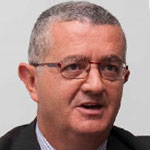 Antonio Nicolás Marchal Escalona
Profesor
Professor
Doctor en Derecho. Licenciado en Derecho. Coronel de la Guardia Civil, docente con más de 25 años de experiencia.
Antonio Nicolás Marchal Escalona
Profesor
Professor
Doctor en Derecho. Licenciado en Derecho. Coronel de la Guardia Civil, docente con más de 25 años de experiencia.
 Andreea Marica
Profesora
Professor
Doctora en Derecho por la Universidad Carlos III de Madrid con la calificación de Cum Laude por unanimidad y con Mención Doctor Internacional. Máster en Derecho Comunitario, Master en Derecho Público y Ciencias Penales, Experto en Crimen Organizado Transnacional y Seguridad.
Andreea Marica
Profesora
Professor
Doctora en Derecho por la Universidad Carlos III de Madrid con la calificación de Cum Laude por unanimidad y con Mención Doctor Internacional. Máster en Derecho Comunitario, Master en Derecho Público y Ciencias Penales, Experto en Crimen Organizado Transnacional y Seguridad.
 Geoffrey Ditta
Profesor
Professor
Doctor en Ciencias Sociales, escuela doctoral 3LA (letra literatura lenguaje) por la Universidad Lyon 2 Lumière Francia. 2012 2019 PhD. (Doctorado) Ciencias sociales, gestión de la empresa Lyon, Francia Universidad Lyon 2 Lumière, Escuela Doctoral 3LA Título: «Internacionalización de una multinacional en Chile» 2012 Maestría II Especializada Ley, Economía, Gestión (con distinción) Perpiñán, Francia IAE Instituto de Administración de Empresas 2011 Maestría I Desarrollo de Negocios Internacionales Montpellier, Francia IAE Instituto de Administración de Empresas 2010 Licenciatura Ciencias, Tecnologías, Salud, (Ingeniería y matemáticas) Perpiñán, Francia Centro Nacional Francés para la Investigación Científica 2019 Profesor doctor Facultad de Economía y Empresa, universidad Nebrija 2018/2019 BNP Paribas / Santander, Banco UCI Manager en Relaciones Internacionales 2015/2018 COMSA Corporación, (Ingeniería, Construcción) Ciudad de México, Manager de Finanzas 2013/2015 Cámara Francesa de Comercio e Industria (CCI) región “País de la Loire” Santiago, Chile Desarrollo Internacional de Empresas (VIE) 2013 Naciones Unidas, Comisión Económica Para América Latina y el Caribe (CEPALC) Ciudad de México, Asistente de Investigación
Geoffrey Ditta
Profesor
Professor
Doctor en Ciencias Sociales, escuela doctoral 3LA (letra literatura lenguaje) por la Universidad Lyon 2 Lumière Francia. 2012 2019 PhD. (Doctorado) Ciencias sociales, gestión de la empresa Lyon, Francia Universidad Lyon 2 Lumière, Escuela Doctoral 3LA Título: «Internacionalización de una multinacional en Chile» 2012 Maestría II Especializada Ley, Economía, Gestión (con distinción) Perpiñán, Francia IAE Instituto de Administración de Empresas 2011 Maestría I Desarrollo de Negocios Internacionales Montpellier, Francia IAE Instituto de Administración de Empresas 2010 Licenciatura Ciencias, Tecnologías, Salud, (Ingeniería y matemáticas) Perpiñán, Francia Centro Nacional Francés para la Investigación Científica 2019 Profesor doctor Facultad de Economía y Empresa, universidad Nebrija 2018/2019 BNP Paribas / Santander, Banco UCI Manager en Relaciones Internacionales 2015/2018 COMSA Corporación, (Ingeniería, Construcción) Ciudad de México, Manager de Finanzas 2013/2015 Cámara Francesa de Comercio e Industria (CCI) región “País de la Loire” Santiago, Chile Desarrollo Internacional de Empresas (VIE) 2013 Naciones Unidas, Comisión Económica Para América Latina y el Caribe (CEPALC) Ciudad de México, Asistente de Investigación
 Ana Quintana Jiménez
Profesora
Professor
Doctora en Turismo por la Universidad Nebrija y Licenciada en Derecho por la Universidad de Alcalá, (CEU Luis Vives) Ha centrado su investigación en el área del Derecho del Turismo, en Derecho Civil, y en aspectos relacionados con la Seguridad y el Terrorismo. Desarrolla su investigación desde el grupo de investigación de “Análisis económico del sistema turístico”.
Ha sido profesora de Legislación turística, Fundamentos de Derecho Civil, Derecho Romano, Introducción al Derecho Comunitario y Modelos de desarrollo turístico. Ha ocupado cargos de gestión en la Universidad Nebrija, como la Dirección del Área de Derecho, Dirección del Master en Derecho Empresarial, Dirección del Master Universitario en Turismo, y actualmente dirige el Grado en Derecho en la modalidad presencial.
Ana Quintana Jiménez
Profesora
Professor
Doctora en Turismo por la Universidad Nebrija y Licenciada en Derecho por la Universidad de Alcalá, (CEU Luis Vives) Ha centrado su investigación en el área del Derecho del Turismo, en Derecho Civil, y en aspectos relacionados con la Seguridad y el Terrorismo. Desarrolla su investigación desde el grupo de investigación de “Análisis económico del sistema turístico”.
Ha sido profesora de Legislación turística, Fundamentos de Derecho Civil, Derecho Romano, Introducción al Derecho Comunitario y Modelos de desarrollo turístico. Ha ocupado cargos de gestión en la Universidad Nebrija, como la Dirección del Área de Derecho, Dirección del Master en Derecho Empresarial, Dirección del Master Universitario en Turismo, y actualmente dirige el Grado en Derecho en la modalidad presencial.
 Paola Rodas Paredes
Profesora
Professor
Doctora en Derecho con mención Europea por la Universidad de Valencia. Máster en Asesoría Jurídica de Empresas por la Universidad Jaime I, Especialista Universitario en Educación Superior por la Universidad Rovira i Virgili. Actualmente Directora del Máster en Derecho de los Negocios Internacionales y profesora del área de Derecho Mercantil.
Paola Rodas Paredes
Profesora
Professor
Doctora en Derecho con mención Europea por la Universidad de Valencia. Máster en Asesoría Jurídica de Empresas por la Universidad Jaime I, Especialista Universitario en Educación Superior por la Universidad Rovira i Virgili. Actualmente Directora del Máster en Derecho de los Negocios Internacionales y profesora del área de Derecho Mercantil.
 Juan Ignacio Ruiz Zorrilla
Profesor
Professor
Licenciado en Ciencias Económicas y Empresariales con Postgrado PDG en el IESE. Poseedor de certificaciones profesionales internacionalmente reconocidas como: CIA- Certified Internal Auditor y CFE- Certified Fraud Examiner.
Juan Ignacio Ruiz Zorrilla
Profesor
Professor
Licenciado en Ciencias Económicas y Empresariales con Postgrado PDG en el IESE. Poseedor de certificaciones profesionales internacionalmente reconocidas como: CIA- Certified Internal Auditor y CFE- Certified Fraud Examiner.Durante los últimos 15 años ha sido el máximo responsable de la Función de Auditoria Interna en distintas empresas: (2002-2007) Grupo TPI/ YELL; (2007- 2012) Telefónica España; (2012-abril 2016) Corporativo de todo el Grupo Telefónica con actividades en 25 países.
En la última etapa como responsable de Auditoria Interna para el Grupo Telefónica ha reportado a la Comisión de Auditoría y Control los resultados de su actividad. Así mismo ha sido miembro del Comité de Principios de Actuación; miembro del Comité de Seguridad del Grupo Telefónica y miembro del Comité de Prevención de Riesgos Penales.
Desde 1997 participa frecuentemente como ponente en jornadas internacionales de América y Europa en temas de Auditoria, Gobierno Corporativo, Riesgos, Control Interno y Cumplimiento.
Actualmente es:
- Consejero de la empresa AUDIOLIS
- Vicepresidente del Instituto de Auditores Internos de España. Donde también desarrolla la actividad como profesor titular de la formación para la obtención de la Certificación Internacional de Auditor Interno- CIA
- Miembro de la Dirección de la Confederación Europea de Institutos de Auditores Internos – ECIIA, que con sede en Bruselas, agrupa a Institutos de Auditoria de 37 países Europeos.
- Secretario General del Instituto para el Cumplimiento Normativo y la Prevención del Fraude.
 Susana Raquel de Sousa Ferreira
Profesora
Professor
Doctora cum laude en Seguridad Internacional por la Universidad Nacional de Educación a Distancia (UNED) y en Relaciones Internacionales por la Universidad NOVA de Lisboa (Portugal), con mención de Doctor Europeo y Doctor Internacional y con acreditación de la ANECA a Profesora Ayudante Doctor. Ha recibido el Premio Extraordinario de Doctorado de la UNED, del curso académico 2016/2017, por su tesis de doctorado. Es Profesora-Colaboradora de la Universidad Oberta de Cataluña. Es investigadora del Instituto Português de Relações Internacionais (IPRI) de la Universidad NOVA de Lisboa y del Centro de Investigación de Seguridad y Defensa del Instituto de Universitario Militar (IUM). Ha sido investigadora invitada en el Institute for the Study of International Migration (ISIM) de la Universidad de Georgetown y en el Instituto Universitario General Gutiérrez Mellado de la UNED, con el que mantiene una estrecha colaboración. Sus áreas de investigación son las migraciones internacionales, seguridad internacional, gestión de fronteras, el Mediterráneo, y la Unión Europea.
Susana Raquel de Sousa Ferreira
Profesora
Professor
Doctora cum laude en Seguridad Internacional por la Universidad Nacional de Educación a Distancia (UNED) y en Relaciones Internacionales por la Universidad NOVA de Lisboa (Portugal), con mención de Doctor Europeo y Doctor Internacional y con acreditación de la ANECA a Profesora Ayudante Doctor. Ha recibido el Premio Extraordinario de Doctorado de la UNED, del curso académico 2016/2017, por su tesis de doctorado. Es Profesora-Colaboradora de la Universidad Oberta de Cataluña. Es investigadora del Instituto Português de Relações Internacionais (IPRI) de la Universidad NOVA de Lisboa y del Centro de Investigación de Seguridad y Defensa del Instituto de Universitario Militar (IUM). Ha sido investigadora invitada en el Institute for the Study of International Migration (ISIM) de la Universidad de Georgetown y en el Instituto Universitario General Gutiérrez Mellado de la UNED, con el que mantiene una estrecha colaboración. Sus áreas de investigación son las migraciones internacionales, seguridad internacional, gestión de fronteras, el Mediterráneo, y la Unión Europea.
 Andrés Tagliavia López
Profesor
Professor
Doctor en Derecho por la Universidad Complutense de Madrid. Premio Extraordinario de Doctorado, Decano Facultad Estudios Sociales en UAX, Vicerrector en UAX, Profesor en UCM, UAX, UEM, EOI, UNNE, Vocal Tribunales Tesinas y Tesis Doctorales, conferencias, ponencias y publicaciones.
Andrés Tagliavia López
Profesor
Professor
Doctor en Derecho por la Universidad Complutense de Madrid. Premio Extraordinario de Doctorado, Decano Facultad Estudios Sociales en UAX, Vicerrector en UAX, Profesor en UCM, UAX, UEM, EOI, UNNE, Vocal Tribunales Tesinas y Tesis Doctorales, conferencias, ponencias y publicaciones. Ha ejercido como Fiscal y actualmente es Abogado ejerciente, especialidad Derecho Penal. Tutor profesional de prácticas Grado y Máster.
 Fernando Tomé Bermejo
Profesor
Professor
Actual Vicerrector de estudiantes y empleabilidad, antes Decano y Vicedecano de la antigua Facultad de Ciencias Sociales, en la Universidad Nebrija. Simultanea el vicerrectorado con la dirección de la Fundación Antonio de Nebrija.
Fernando Tomé Bermejo
Profesor
Professor
Actual Vicerrector de estudiantes y empleabilidad, antes Decano y Vicedecano de la antigua Facultad de Ciencias Sociales, en la Universidad Nebrija. Simultanea el vicerrectorado con la dirección de la Fundación Antonio de Nebrija.Ha sido Rector y Decano de IEDE Business School Chile, Director de IEDE Business School Madrid y de la Escuela Universitaria Real Madrid, con 13 sedes en el mundo.
Profesor acreditado como contratado doctor en economía por ANECA. Desde 2001 ejerce la docencia universitaria y lo ha hecho como miembro del claustro de cuatro universidades españolas, Universidad San Pablo CEU, Universidad de Alcalá, Universidad Europea de Madrid, actualmente en la Universidad Nebrija; y de dos extranjeras, Universidad Andrés Bello (Chile) y Universidad de las Américas de Ecuador.
Su ámbito de conocimiento es la teoría económica. En los últimos cinco años, ha escrito seis artículos científicos indexados, un libro, ha dirigido dos tesis doctorales y ha participado en siete libros como director, coordinador y autor de capítulos. Su última publicación científica es de mayo de 2019, en la revista Suiza Resources MDPI (Scopus Q1). A nivel divulgativo, y en los últimos 4 años, acumula más de veinte artículos periodísticos y su última publicación es de enero de 2020, en el periódico El País-Cinco días, sobre el valor de la democracia española. Participa habitualmente en las tertulias económicas de Intereconomía Radio, “A media sesión” y Capital Radio, “Mercado abierto”.
Profesor visitante o invitado en 15 universidades fuera de España. Su estancia internacional más relevante fue en Chile, donde residió entre 2013 y 2015.
More Academic Information
Skills
Basic SkillsRoyal Decree 1027/2011, of July 15, establishes the Spanish Framework of Qualifications for Higher Education, known as MECES, and the description of its levels, whose purpose is to allow the classification, comparability and transparency of the qualifications of higher education in the Spanish educational system, which serves as a reference to facilitate mobility of people in the European space of higher education and in the international labor market. Thus, the third level corresponds to Master's degrees that are characterized as "advanced, specialized or multidisciplinary education, oriented to academic or professional specialization, or to promote initiation in research tasks" and whose characteristics are defined in the following descriptors:
- Possess and understand knowledge that provides a basis or opportunity to be original in the development and/or application of ideas, often in a research context.
- That students know how to apply the knowledge acquired and their ability to solve problems in new or unfamiliar environments within broader (or multidisciplinary) contexts related to their area of study.
- That students are able to integrate knowledge and face the complexity of making judgments based on information that, being incomplete or limited, includes reflections on social and ethical responsibilities linked to the application of their knowledge and judgments.
- That students know how to communicate their conclusions and the knowledge and ultimate reasons that sustain them to specialized and non-specialized audiences in a clear and unambiguous way.
- That students have the learning skills that allow them to continue studying in a way that will be largely self-directed or autonomous.
- The student must acquire knowledge about human resources that allows him/her to work in a cybercrime team.
- The student must be able to understand how his/her profession affects other departments of the company or institution in the field of cybercrime.
- The student must master the sufficient techniques of fighting against cybercrime in this field in order to obtain and analyze information, evaluate its relevance and validity, synthesize it and adapt it to the context.
- The student must be able to deal with complex and unpredictable situations in a systematic and creative way, with critical judgment, with incomplete information, taking risks, making decisions and communicating them to a professional audience in the field of cybersecurity and cybercrime.
- The student must be able to communicate correctly both orally and in writing, using the most current technology, in the field of cybersecurity and cybercrime.
- The student must be able to act autonomously in the planning and implementation of projects and decisions on prevention and action against cybercrime.
- The student must be able to play different roles within a cybersecurity and cybercrime team, particularly the leader.
- The student, in the field of action against cybercrime, must be able to recognize the need for change and must have the necessary skills to manage it.
- The student must be able to act autonomously in a framework of responsible freedom, in the field of action against cybercrime.
- The student must be able to add value to the company or institution through his/her creativity and participation in the action against cybercrime.
- Ability to integrate in its action against cybercrime, the values and policies of effective equality, especially between women and men and attention to disability.
- Be able to analyze and develop web security systems applied to the prevention of cybercrime.
- Be able to advise on compliance with the regulatory legislation on data protection in security matters.
- Be able to plan and apply prevention measures against fraud in electronic commerce.
- Be able to apply the biometric properties to the area of computer security and communications.
- Be able to distinguish the different agents involved in computer security, and know how to advise them in an integrated manner, allowing collaboration with other departments of the entity.
- Be able to program and analyze tasks in various programming languages in the area of computer security and communications.
- Be able to use scientific-technical tools to evaluate the reliability and robustness of complex computer systems, applied to the prevention of cybercrime.
- Be able to design a security plan adapted to the needs of the environment and its risk profile, applied to the prevention of cybercrime.
- Be able to use with skill the main malware detection and classification tools and perform simple reverse engineering exercises in the context of cybersecurity.
Be able to perform, present and defend, once all the credits of the syllabus have been obtained, an original assignment before a university tribunal, consisting of a research project in the field of cybercrime encapsulating the competences acquired in the teachings.
Admissions
Admission profile
Those interested in studying and obtaining the Master's Degree in Cybercrime from the Antonio de Nebrija University must be university graduates who carry out or wish to carry out their activity in the field of security, cybercrime and cybersecurity.
The access profile will be for the following Bachelor's Degrees: Bachelor's Degree in Computer Engineering or equivalent degree, Bachelor's Degree in Telecommunications or equivalent degree, Bachelor's Degree in Software Engineering or equivalent degree and Bachelor's Degree in Information Systems or equivalent degree.
Admission criteria
A) Submitting documentation
In general, the admission documentation will be submitted to the Admissions Department.
In general, the admission documentation will be presented to the Admissions Department. The student must provide the originals or certified copies of the submitted documentation within the period established by the University in order to formalize his enrollment. Any inaccuracy, falsity or omission of the data, statement or document provided by the student in the period of admission, will determine the impossibility of continuing to exercise the right from the moment the University has proof of these events, proceeding to the cancellation of the application for admission submitted and the place awarded, without prejudice to any criminal, civil or administrative responsibilities that may arise.
- Completed admission application.
- Identification document (DNI) or valid passport
- 2 passport-size photos
- In case it is necessary, a letter issued by the University in the country where the degree is issued in which the level that grants access to the Master's studies was taken.
- Academic record with the grades of the studies that grant access to the Master's degree.
- Spanish official university degree.
- Official degree issued by a foreign higher education institution belonging to the European Higher Education Area (EHEA) that grants access, in the country of issuance, to official master's degrees.
- Official degree issued in a foreign educational system not belonging to the EEES. In this case, access will be conditional on verifying that the studies completed correspond to a level of education equivalent to that of the official Spanish university degrees, and that they grant access to official master's studies in the country in which the degree was issued. This procedure does not imply, in any case, the homologation of the previous degree, nor its recognition for any other purpose than to access master's studies.
- Personal letter of intent addressed to the Director of the Master's Degree in Cybercrime, explaining the reasons why he/she wishes to carry out these Master's studies, as well as the academic and professional expectations that lead him/her to this choice.
- Updated Curriculum Vitae.
- Two letters of recommendation.
B) Personal interview and Tests
1.- Spanish language level test for foreigners 10%
In order to know the foreign student's real level of knowledge of Spanish, the Institute of Modern Languages will design a language placement test. The level tests consist of a written exam with multiple choice questions, oral and written comprehension, and use of the language, and lasts 60 minutes. They are taken in person or online. Depending on the results of this test, the student will be placed at the corresponding level.
It will not be necessary for the candidate to take the language placement test if he submits a document that proves knowledge of the Spanish language at B2 level of the CEFR. The level accreditation will be validated through the official degrees accepted by the table of certificates accepted by ACLES.
2.- Personal interview 90% for foreigners, 100% for Spanish speakers.
Carried out by the University faculty and advisors, this interview is aimed at verifying the candidate's suitability profile in relation to the degree. It is about determining if the candidate has sufficient motivation, education and knowledge, abilities, aptitudes, communication skills, extracurricular activities and future interests necessary to be admitted as a student in this postgraduate course at Nebrija University.
Employability
Career Opportunities
The Master's Degree in Cybersecurity of Nebrija University enables you to practice a professional career in positions of responsibility such as:
Collaboration Agreements for Professional Internships
This Master program maintains collaboration agreements for professional internships with some of the leading companies and institutions in the sector, including:
Activities in Cybercrime
Visit all the Activities of the School of Law and International Relations
3rd International Conference: Challenges to Global Security
With representatives of organizations such as DSN, CNPIC, CITCO, ISDEFE, ICEX and Telefónica.


